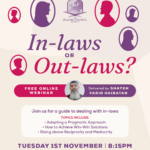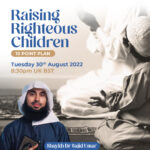A successful marriage should in theory last a lifetime. As a result, there is a lifetime’s worth of work that needs to be done between spouses to make the marriage function well. This also means that for marriages that are struggling, there are many ways in which a couple can be advised.
However, here at the Council, there is only so much time available to guide a couple through the basic principles of successful marriages. There may be moments when all you have are thirty minutes to speak to a couple in need of help. What advice can you offer them in such a short space of time? Do you focus on the principles governing happiness within a Muslim family? Do you provide an explanation of the essential rights upon one another? Do you go through practical steps to a successful reconciliation?
All of the above can provide meaningful and necessary help to any couple. This article will focus on a different message altogether; one that can yield far more results than just a satisfactory and stable marriage. The message that will be given, has the potential to transform the family into a highly productive and effective unit. This will not only help a couple to reap their own personal rewards, but can help leave a legacy for the Hereafter and their community.
Marriage by design has difficulty. It requires two people to get along with one another and express love for one another for the rest of their lives. However, whereas the love for one’s parents, siblings and children may be somewhat unconditional because of the blood bond; the love between spouses is conditional in the sense that the love develops over time. So how can a Muslim couple maintain and increase their love for one another so that their relationship can last a lifetime?
One answer is that for a relationship such as a marriage to last a lifetime, it is important to embark on a project for a lifetime. As Muslims, this can come in the form of working together and towards an Islamic goal.
This may not come across as the obvious solution to a successful marriage, so it is important to make the case for why this project of a lifetime is needed and what it entails.
Through an assessment of multiple cases where Muslim couples are arguing and having marital problems; a common question that is posed to them is whether they are engaged in any joint Islamic activities. It is unsurprising to receive a negative response to this question, because it touches upon the very fabric and purpose of Islamic relationships and can cause great embarrassment initially. The notion that marriage, love and life is all for the sake of Allāh can easily be forgotten when the relationship between spouses becomes unhealthy. Embarking on an Islamic activity or project together can help a couple restore this focus and help the marriage thrive. What follows in this article are a few of the positive outcomes that can be expected from applying this advice.
1. It will establish and reinforce love that is built on a foundation of īmān
Since our belief as Muslims is that Allāh is Al-Qawiyy (the Most Powerful) and Al-Bāqī (the Most Enduring), the logical conclusion is that a relationship centred on a Lord of such attributes will also become the most powerful and most enduring of all relationships.
The Prophet ﷺ said: “There are three qualities that, whoever has them, will taste the sweetness of īmān:
- To love Allāh and His Messenger more than anyone else
- To love a person only for Allāh’s sake
- To hate returning to disbelief after Allāh had saved him from it, in the same way that he hates to be thrown into the Fire.”[1]
When a discussion arrives about love for the sake of Allāh, we may consider how we love people of knowledge, friends or even strangers we have only met once or twice. However, it may be less common to think about love for the sake of Allāh in the context of a person’s own household. Whilst the statement of love for Allāh’s sake can flow quite freely from the tongue, it is often separated and differentiated from the love for a spouse. This is because the love for a spouse can often be built through the practices and events within the relationship. Therefore, if the relationship is not built upon the consciousness of Allāh, it is missing out on the strongest possible anchor.

As a rule, the distance between the spouses is proportional to the distance between Allāh and each spouse. Therefore, the nearer the spouses both draw to Allāh, the nearer they will find themselves drawn to one another.
The more times a couple sit down together to partake in joint Islamic activities, the more that couple have loved each other for the sake of Allāh. In turn, the more they love each other for His sake, the closer they become.
2. It will evict pettiness from your lives
Countless cases observed at the Council show there to be a very strong correlation between couples who do not have a joint Islamic activity and their susceptibility of falling out over the pettiest of matters. Such couples may even feel embarrassed to share their problems with an adviser due to the pettiness of such matters. It is quite common to hear the couple say that they have forgotten the cause of the argument itself but remember the feeling of being upset. This is not healthy as there is no identifiable and meaningful cause for being upset, which makes it difficult to understand what needs to be reconciled and achieve closure.
The lack of collective Islamic activities can leave a void, empty space within a marriage which can easily be occupied by Shaytān. This is because a window of opportunity has been left open for him that could easily have been closed and locked with something as simple as reciting the Qurʾān together for 15 minutes a day. Couples who invite Islam into their daily or weekly schedules, can enjoy their minds and priorities ascending to new heights that transcend this world and creep into the Hereafter. As a result, they find themselves too busy to be slowed down or become hurt by petty things.
The overarching life mission of the couple therefore becomes acquiring the pleasure of Allāh, thus expelling pettiness from the homes by virtue of the joint Islamic activities.
3. It will assist you in the sacrifices you need to make for Islam
During the time of the Prophet ﷺ, a dispute happened between two men over the ownership of a palm tree. To settle the disagreement, the Prophet ﷺ requested one of them to hand over the ownership of the palm tree to the other in return for a palm tree in Paradise. The man refused. Abu Daḥdāḥ caught wind of this offer, so he approached the man who refused to hand over the palm tree and said to him,
“Sell me your palm tree in place for my orchard,” to which the man agreed. Abu Daḥdāḥ then made his way to the Prophet ﷺ and said: “O Messenger of Allāh, I have purchased the palm tree with my orchard, so hand it over to him, for I have handed it over to you.”
The Prophet ﷺ said over and over again: “How plentiful are the sweet date clusters that Abu Daḥdāḥ now has in Paradise!”
Immediately, Abu Daḥdāḥ returned back home to his wife and said: “O mother of Dahdāh, walk out of the garden, for I have sold it in place for a palm tree in Paradise.” Her response was unconditionally supportive: “What a successful transaction!”[2]
She then made her way to her children and took out from their mouths the dates that they were chewing, then emptied their pockets and sleeves as well, and then left the garden for its new owner to take possession.
This narration illustrates the collective desire of Abu Daḥdāḥ and his wife to please Allāh. It also shows how important it is to support one another at times when sacrifices for the sake of Allāh are made. The action of Abu Daḥdāḥ was a sacrifice that would undoubtedly present a potential hardship for his family; but the unconditional support in this sacrifice for the sake of Allāh, highlights the importance of spouses encouraging and supporting one another for a higher purpose.
4. It will make your spouse the most attractive person to you
A brother relating his journey to repentance mentioned how he was raised in an upper-class family, only ever mixing with the elite. According to him, beauty was somehow far more prevalent in their midst. He said:
“After I found my way back to Allāh, I began to search for marriage, but because of my background, my eye had become accustomed to certain standards. I made so much du’ā for a wife of very specific characteristics. Each time I did ‘Umrah, drank ZamZam water, or was in prostration, my hands were raised in du’ā and my description to Allāh of what I wanted was the same each time. Years passed by and my du’ā did not change one bit, until the day came when Allāh would send the very mirror reflection of my du’ā to the home of my parents, after which we were married.”
He continued: “As I was asleep one night, I briefly woke up to turn from side to side, only to catch a glimpse of my wife who was standing in the middle of the room in her full Hijāb. There, in complete silence and pitch-black darkness, she was in the middle of her night prayer. I had no idea that this was her habit. It was only a brief snapshot before I fell back to sleep, yet the image of her standing in prayer was etched onto my mind forever. As a result, whenever I would witness beauty that my insinuations suggested may top the beauty of my wife, this image of her in prayer at night would appear before me, and at once I realise that I have the most beautiful woman in the world.”
The account above is just one example of how Islamic actions can increase the love between spouses. The reason for this is because the īmān of a believer is what is most beautiful to other believers. To contextualise this, it is important to reflect on the love a Muslim has for the Prophet ﷺ and the companions. The love is so substantial because of the beautiful and aspirational characteristics displayed by them in their lives. Therefore, when a spouse displays a characteristic that reminds their partner of the Prophet ﷺ, the companions and other pious people; the attraction to that person naturally increases. Furthermore, if the married couple engage in these positive actions together, they are likely to see the beauty within each other more often.
5. It will ease the intensity of the interrogation before Allāh
The Day of Reckoning will be a day that no one can escape. Everyone will be held accountable for their actions and most Muslims will not be granted Paradise until they are able to satisfactorily answer to Allāh in His court of judgement. In relation to this day, it will not be possible to cite ignorance because the Prophet ﷺ has informed everyone of this event and what it will entail. He ﷺ said: “Allāh is going to ask each shepherd about his flock, whether he upheld this trust or abused it, until a man will be asked about his household.”[3]
A spouse is potentially the most significant witness a person can have for their actions; because married couples are not only committing to spend the rest of their lives together, but also see one another at times and during situations where no one else is present.
As a result, a married couple can testify for one another on the Day of Reckoning in ways that are not possible for anyone else. Ensuring the presence of a joint Islamic activity in those moments where no one else is watching other than Allāh, can help to ensure that those private moments are not wasted in idleness. The result of this could mean that the inevitable interrogation before Allāh is eased to some degree by having a life companion as a positive character witness.
6. It can be the reason for your joint entry to Jannah
A project of a lifetime can end with the achievement of a lifetime. There is no greater measure of success than the achievement of a place in Jannah. However, working as a married couple for this reward can ensure that both parties get their together.
Allāh says in the Qur’an:
إِنَّ أَصْحَابَ الْجَنَّةِ الْيَوْمَ فِي شُغُلٍ فَاكِهُونَ (55) هُمْ وَأَزْوَاجُهُمْ فِي ظِلَالٍ عَلَى الْأَرَائِكِ مُتَّكِئُونَ (56)
“Indeed, the companions of Paradise, that Day, will be amused in joyful occupation. They and their spouses in shade, reclining on adorned thrones.”[4](36:55-56)
This verse demonstrates just how meaningless it can be for married couples to not engage in Islamic activities with one another. With the end goal being Paradise, a realisation emerges that a spouse is not just a means to Paradise but an essential component and companion on that journey. Furthermore, the journey of a married couple continues into Paradise. This all makes the rationality behind engaging in a regular Islamic activity difficult to deny.
If the need for a joint Islamic activity has been established between a couple, the following question can be a source of excitement. This question is: What does a joint Islamic activity look like? Below are a few suggestions that may prove to be love-awakening, mercy-inducing, and relationship-transforming methods.
(a) A weekly drive to the local Masjid to attend a class
Driving to a local mosque for a weekly class can be a very empowering and rewarding experience. After the class, the couple might go to a local restaurant and reflect over the lessons from the class and share notes. This can convert the experience into a regular date night that is made possible by the remembrance of Allāh. As a result, the couple become closer to one another by becoming closer to Allāh. This positive association can also endure in other aspects of the couple’s lives.
The obvious obstacle that can come in the way of this becoming a regular event is childcare. There is no harm in asking family or friends to look after children for a few hours once a week and coming to an arrangement to return the favour. In fact, another married couple could be encouraged to engage in Islamic activities in the same way so there is added reward for establishing this kind of arrangement.
(b) A movie night
Consult people whom you trust and create a playlist of engaging and heart-softening Islamic material. Create such a playlist that will last you for 6 months at a pace of two videos a week, for example. To get the ball rolling, you may wish to start with Sheikh Asim Khan’s lecture series titled “Touching Moments with the Messenger (ﷺ)”[5]. The length of the lecture is irrelevant – the key word is consistency.
(c) Two units of joint Salāh before you sleep
Make a habit of praying together at night, but start with something manageable, like two units that you carry out together after your ‘Isha prayer (and its Sunnah), and before your Witr prayer. Couples – especially those who quarrel or complain of a relationship devoid of mercy – truly have no excuse in missing this activity. As the Prophet ﷺ said: “May Allāh have mercy upon a man who gets up at night to pray, then wakes his wife and she prays, but if she refuses, he sprinkles water in her face. May Allāh have mercy on a woman who gets up at night to pray, then wakes her husband and prays, and if he refuses, she sprinkles water in his face.”[6]
Couples are quick to argue that mercy is missing in their relationship, but very slow in doing what is required to bring it back. Here, the Prophet ﷺ personally makes du’ā that mercy enters the lives of couples who pray at night, and his du’ā will not be rejected.
(d) Ramadan fasts that need making up
Most women will have days of Ramadan that need to be made up and will require encouragement to complete these fasts. This can be converted into a marriage investment opportunity by specifying the Monday and/or Thursday of each week to fast together as a couple whenever possible. According to the Prophet ﷺ, one of the forms of happiness that the fasting person experiences is during the breaking of the fast. How many opportunities of happiness have couples who miss this weekly moment missed out on? Set your alarm from now.
(e) Husband and wife reading club
Create a reading list for just you and your wife. Populate the list with both Islamic and useful non-Islamic reads. Endeavour to complete one book a month. Whether you are shopping or taking a walk, or just milling around the house, you will never be short of interesting conversation-fodder that many couples complain they lack. Furthermore, this activity nurtures listening skills and paves a solid pathway to expressing views and interests. These are important communication steps that are dangerously absent in many marriages.
To get the ball rolling, here are three books I personally recommend:
- Surah Yasin – The Heart of the Qur’an, by Sheikh Asim Khan
- Muhammad (ﷺ) :11 Leadership Qualities that Changed the World, by Nabeel Al-Azami
- Atomic Habits, by James Clear
(f) Husband, wife, and children
Whilst husband and wife need time together, children also need time with their parents. Islamic nurturing can be acquired during a fun road trip; as children observe their parent’s mutual respect for one another, their mother’s dedication to the proper Hijāb, their father’s eagerness to pray on time even if under a tree and their parent’s recitation of the Qur’ān during parts of the journey. These moments can be far more effective than what is learnt in a classroom or a book.
As a suggestion to get you started, consider signing up to the mailing list of familyevents.org.uk, who provide highly enjoyable opportunities for Muslim families in the UK. If you do not have access to something like this in your region, then be proactive. Learn from their model and replicate something similar, even if at the scale of two or three families.
(g) A regular trip to the Al-Aqsa Mosque in Palestine
Al-Aqsa requires your support, but your family also requires the support that Allāh gives to the visitors of places of barakah (blessing). Al-Aqsa is a place of barakah. Visit as a couple and inhale from its pure air. Prostrate on its blessed land and supplicate to Allāh on its holy sanctuary for the aid of Al-Aqsa and the aid of your family. Find a recommended travel agent that offers a full programme and book your trip.
(h) Design a joint Islamic project together
Henry Ford once said: “Coming together is a beginning. Keeping together is progress. Working together is success.”[7]
The difference between success and failure is a great team. Great things are never done by one person. When you and your spouse are goal-oriented, your mistakes are smaller, your quarrels are fewer, your lines of communication are wider, your sense of unity is clearer, your marriage satisfaction is greater and your bond is immeasurably stronger. This bond is bound to fade if you are both constantly working apart.
Your joint Islamic project could be to:
- Understand 90% of the Qur’ān in Arabic within 3 years
- Set up a modern da’wah office/cafe within your locality
- Memorise the entire Qur’ān with one ijāza (license) in tajwīd[8] each within 5 years
- Set up a specialist tajwīd institute within your region within 2 years
- Raise funds for 3 promising students of knowledge in your locality to further their Islamic education overseas.
- Investigate the needs and problems of your locality and plan a project to help meet those challenges
Start a frank conversation immediately. Pinpoint your strengths, brainstorm ideas, consult other teachers and families, and find your common goal. Do this for the sake of Allāh, then for the sake of the Home of the Hereafter, then for the sake of your marriage.
The core message of this entire article is to work together as a Muslim couple towards a common Islamic goal. The benefits that can be expected by those who act upon this advice have been clearly presented in the article. Suggestions of how this can be done practically have also been provided for inspiration. May this be the beginning of something great for all couples that read this article and may Allāh reward those that act on the advice given.
Did you enjoy this article?
Please donate today to help us to continue issuing vital community guidance through articles, classes and consultations.
[1] Al-Bukhāri and Muslim, on the authority of Anas
[2] Ahmad, on the authority of Anas
[3] Ibn Hibbān, on the authority of Anas
[4] Al-Qur’ān, 36:55-56
[5] https://youtube.com/playlist?list=PL–4JIEun5puDvftK8EEERxO0xklpzOU6
[6] Abu Dāwūd, on the authority of Abu Huraira
[7] https://www.jmark.com/27-great-quotes-teamwork-inspire-jmark-hope-will-inspire/
[8] The set of rules governing the way in which the words of the Qur’ān should be pronounced during its recitation.














